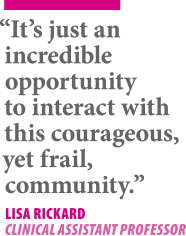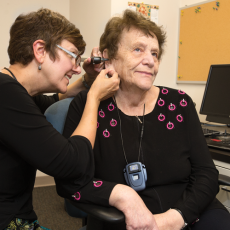- December 11, 2015
- By Liam Farrell
Neli Melman has lost many things that cannot be replaced: a childhood stolen and a homeland ravaged by war; loved ones murdered along with nearly 34,000 other Jews by German death squads at the Babi Yar ravine in 1941; and her medical career squashed by systemic anti-Semitism in the Soviet Union.
Something can be done, however, about her hearing loss.
Melman was the first patient to get new hearing aids and training in how to use them as part of a partnership between the University of Maryland and the Holocaust Survivor Program at Rockville’s Jewish Social Service Agency (JSSA).
Lisa Rickard, clinical assistant professor in the Department of Hearing and Speech Sciences, says research has shown that hearing loss in the elderly can contribute to cognitive, psychosocial, and physical decline if not treated.
“Communication is a human right,” Rickard says. “It’s just an incredible opportunity to interact with this courageous, yet frail, community.”
Siemens Government Technologies Inc. and Sivantos Inc. donated 40 pairs of hearing aids to JSSA, which then reached out to UMD faculty and students for help in issuing them to patients. With support from the Conference on Jewish Material Claims Against Germany and local donors, JSSA assists more than 400 Holocaust survivors who are in financial need in Maryland, Washington, D.C., and northern Virginia.
 Like Melman, most of the survivors that JSSA helps are from Central and Eastern Europe and the former Soviet Union, says Ellen Blalock, the agency’s Holocaust Survivor Program coordinator. When the Nazis invaded the Soviet Union in 1941, the survivors fled eastward to escape certain death. The refugees who returned to the Soviet Union after the war suffered decades of oppression and were only able to emigrate to the United States when they were older and out of the workforce.
Like Melman, most of the survivors that JSSA helps are from Central and Eastern Europe and the former Soviet Union, says Ellen Blalock, the agency’s Holocaust Survivor Program coordinator. When the Nazis invaded the Soviet Union in 1941, the survivors fled eastward to escape certain death. The refugees who returned to the Soviet Union after the war suffered decades of oppression and were only able to emigrate to the United States when they were older and out of the workforce.
For the 70 years since the end of the war, Blalock says, survivors have remained haunted by the hatred, violence and loss they experienced during the Holocaust.
“Our survivors matter to us and they have value,” she says. “We can’t go back and fix the past, but we can change the future.”
